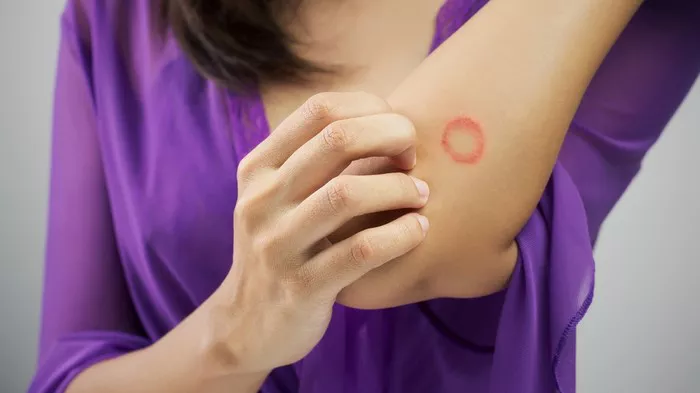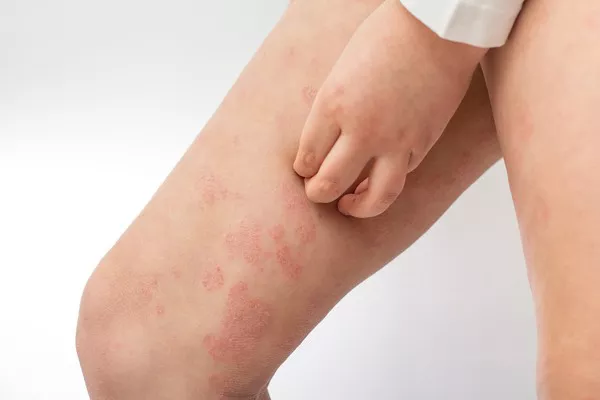Ringworm, despite its name, is not caused by a worm but by a group of fungi called dermatophytes. This common skin infection can affect various parts of the body, including the scalp, feet, groin, and nails. One of the hallmark symptoms of ringworm is itching, which can vary in intensity. A common observation among sufferers is that the itching seems to worsen at night. In this article, we will explore whether ringworm truly itches more at night and why this might be the case.
Understanding Ringworm
Before delving into the specifics of nighttime itching, it is essential to understand what ringworm is and how it manifests. Ringworm is a fungal infection that thrives in warm, moist environments. The fungi responsible for ringworm feed on keratin, a protein found in the outer layer of skin, hair, and nails. This results in characteristic red, circular rashes with a raised edge that may blister and ooze. The affected area often becomes scaly and itchy.
The Itch: A Closer Look
Itching, or pruritus, is a common symptom of many skin conditions, including ringworm. It is the body’s response to various stimuli, often involving the release of histamines and other chemicals in the skin. When it comes to ringworm, the itching is primarily due to the body’s immune response to the fungal infection. As the fungi invade the skin, the body attempts to fight back, causing inflammation and triggering the sensation of itching.
Why Itching May Worsen at Night
There are several reasons why ringworm itching may seem more intense at night:
1. Circadian Rhythms: The human body operates on a circadian rhythm, a natural, internal process that regulates the sleep-wake cycle and repeats roughly every 24 hours. This rhythm affects various physiological processes, including skin functions. Studies have shown that the body’s immune response can be more active at night, which might lead to increased inflammation and, consequently, more itching.
2. Reduced Distractions: During the day, activities and distractions can keep the mind off the itching. However, at night, when there are fewer distractions and the individual is trying to relax or sleep, the sensation of itching becomes more noticeable.
3. Temperature and Blood Flow: Body temperature tends to rise at night, which can exacerbate itching. Increased blood flow to the skin can also intensify the itch sensation. The warmth of the bed and blankets may further contribute to this effect.
4. Dry Skin: The skin can become drier at night, especially in environments with low humidity or when exposed to heating systems. Dry skin is more prone to itching, which can make the discomfort of ringworm more pronounced.
Managing Nighttime Itching
Managing the itching associated with ringworm, particularly at night, is crucial for comfort and to prevent secondary infections caused by scratching. Here are several strategies to help alleviate nighttime itching:
1. Topical Treatments: Over-the-counter antifungal creams, ointments, or powders are effective in treating ringworm and reducing itching. Ingredients like clotrimazole, miconazole, and terbinafine are commonly used. Applying these treatments before bed can help manage symptoms throughout the night.
2. Oral Antihistamines: Taking an oral antihistamine before bed can reduce itching by blocking the action of histamines. These medications can also have a sedative effect, helping with sleep.
3. Cool Compresses: Applying a cool, damp cloth to the affected area can soothe itching and reduce inflammation. This can be particularly effective before going to bed.
4. Moisturizers: Keeping the skin moisturized can prevent dryness and reduce itching. Using a hypoallergenic, fragrance-free moisturizer can help maintain skin hydration.
5. Loose Clothing: Wearing loose, breathable clothing made of natural fibers like cotton can minimize irritation and allow the skin to breathe. Tight clothing can trap heat and moisture, worsening the itch.
6. Environmental Control: Maintaining a cool, comfortable sleeping environment can help reduce itching. Using a humidifier to add moisture to the air can also prevent skin from becoming too dry.
SEE ALSO: Does Ringworm Blister When Healing?
When to See a Doctor
While over-the-counter treatments and home remedies are often effective in managing ringworm and its symptoms, there are times when professional medical advice is necessary. If the infection does not improve after a few weeks of treatment, spreads to other parts of the body, or is accompanied by severe symptoms, it is important to see a healthcare provider. Prescription-strength antifungal medications may be required in such cases.
Conclusion
Ringworm is a common fungal infection that can cause significant discomfort, particularly due to itching. The perception that itching worsens at night is supported by several physiological and environmental factors, including circadian rhythms, reduced distractions, temperature changes, and skin dryness. Understanding these factors can help in managing symptoms more effectively. By employing a combination of topical treatments, oral medications, and environmental adjustments, individuals can find relief from nighttime itching and improve their overall comfort and quality of sleep.
Related Topics:



























